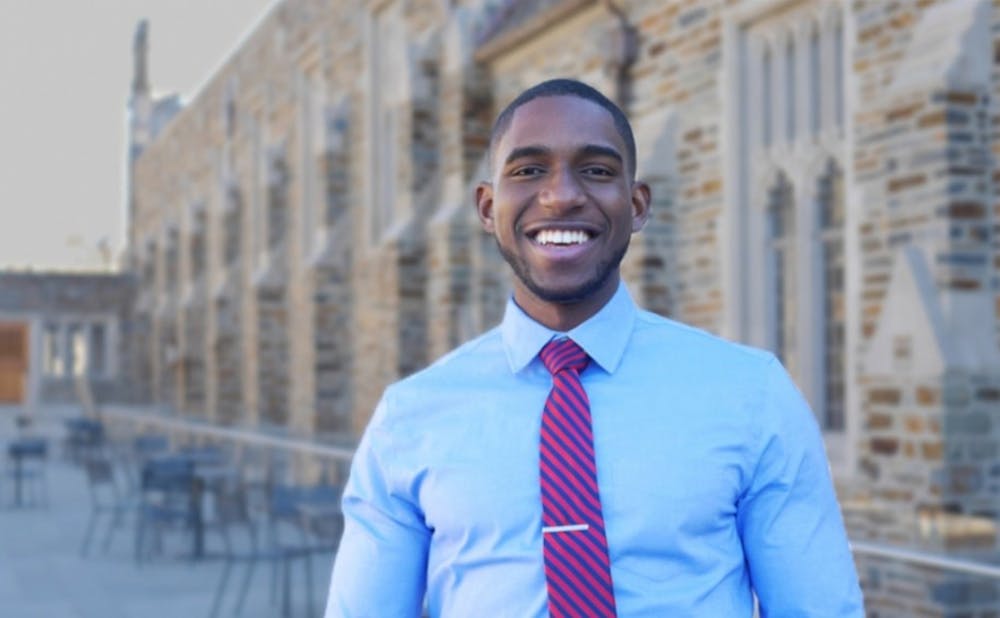With senior Trey Walk set be the next Young Trustee, The Chronicle caught up with Uzoma Ayogu, current Young Trustee and Pratt '17. Ayogu, who was elected by undergraduates in 2017, gave advice for the incoming Young Trustee to The Chronicle in a series of messages. He shared the essential qualities for the job and the lessons he’s learned as a member of the Board. This interview has been edited for length and clarity.
The Chronicle: How have you liked life on the Board of Trustees?
Uzoma Ayogu: I’ve enjoyed it. It's been a masterclass in seeing all the competing priorities and the level of complexity that organizations this large have to deal with. For example, I didn't realize the importance of the hospital system in the University ecosystem.
There’s a strong sense of collegiality amongst trustees, and folks are high energy and want to get to know you and the perspective you bring to the table. There's also a strong sense of responsibility and heightened awareness when anything happens at the school.
Prepping for meetings is akin to getting ready for a midterm—you get sent hundreds of pages of reading, and then you have to ascertain, based on topics on the docket, what additional [research] you may need to do.
TC: What are the most challenging parts about being on the Board?
UA: The Board has 37 people—that's a lot. You have to know where your experience and perspective may add value and where someone else's [point of view] may be better suited. One person's voice can easily change the mood of the room so understanding that balance is tough.
[As an undergraduate] you're used to just doing and not as much advising, so it can be frustrating to have well-defined problems and observe the pace at which change may happen. You have to be quite deliberate and follow a process because so many folks [will be] impacted. Changing culture in an academic institution does take time.
TC: What advice do you have for future Young Trustees?
UA: Take time to try and observe at first. You want to understand what's currently happening, why it's happening and what the future plans are before diving in.
Set up one-on-one [meetings] with trustees who are [near] the end of their second terms as they can give a lot of color to happenings over an extended period of time. I’d also make time to get to know the chairs of various committees, task forces and the Board.
Our age is a superpower and asset—use that power to translate issues or perspectives when you notice there may be a disconnect between what’s understood by most and reality. Don’t be scared to provide [your opinion].
Trustees see you as equals, and they go out of their way to make you feel comfortable, so you can feel confident.
TC: Do you think being a Young Trustee affects how the other Board members view or treat you?
UA: It's an asset. Everyone comes from different backgrounds and industries, but there are very few who are as close to the undergraduate experience as you are. Oftentimes, Trustees may seek you out to [discuss] different things they're thinking about.
TC: What are some valuable lessons you’ve learned during your time on the Board?
UA: Having a ‘conservative drag on judgement’ is usually a good thing when making decisions. It forces you to slow down and consider the root causes and other consequences versus looking quickly for acute cures to chronic problems. We like to simplify things as one person's fault. Often issues have external and internal causes and they play a role in certain outcomes. It’s important not to consider things in a vacuum. You have to consider history even beyond your time at Duke.
When building strategy you should consider three questions: What’s the the outcome you’re trying to create? What’s happening on ground? And, what are the external factors and viewpoints that need to be considered or could affect this decision?
It’s also important to be able to really develop a 10, 20, 50 and even 100-year-long view as some decisions have those types of ramifications so you can't be too short-sighted. You have to think about how shifts in education and policy may affect the University and higher education while also planning for today’s challenges.
[I've learned] votes are not as important as one might think. Decisions are almost always made on consensus. This does not mean we always agree with each other initially, but by presenting new information, monitoring issues and weighing consequences, multiple viewpoints get considered before there is an eventual ‘best path’ forward. Your ability to build consensus among your peers and consider new and novel approaches or information will make you effective.
Finally, you don’t need to be in the boardroom to make a difference. By virtue of getting to know which administrators are working on what, building relationships with them and understanding the University’s priorities and constraints, you can give informed feedback throughout your time on the Board and even beyond as you’re continually exposed to new information, opportunities and issues.
TC: Do you foresee any changes on how the Board addresses issues?
UA: The recent governance changes were a huge shift in how the Board is attempting to be more nimble in responding to issues and having a faster and more effective feedback loop. It was a very involved process to come up with the new structure.
Get The Chronicle straight to your inbox
Signup for our weekly newsletter. Cancel at any time.

